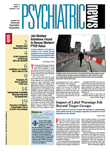The collapse of the I-35W bridge over the Mississippi River in downtown Minneapolis on August 1 reverberated emotionally throughout the Twin Cities, psychiatrist Alan Radke, M.D., told Psychiatric News.
“Everybody knows the bridge and has traveled over it, so the impact was communitywide,” said Radke, medical director for the Minnesota Department of Human Services' State Operated Services and chair of the Minnesota Psychiatric Society's Disaster Preparedness Committee.
Radke is no exception. He lives nearby and had ridden his bicycle to work every day on roads running beneath the span. His son-in-law was driving toward the bridge at 6:05 p.m. that Wednesday and watched it buckle, but he was able to drive safely off the last exit ramp.
Chance probably prevented even more deaths than the 13 reported as of late August. About 100 cars were on the bridge as it went down, but police, firefighters, and the public responded immediately to help survivors, said Radke. Red Cross headquarters were within walking distance of the disaster, which helped that organization take the lead in providing rescue services and services to survivors and families.
“We thought of ourselves as complementing that response, so coordination with the Red Cross was important,” he said. “We expect our role in the longer term will be largely educational, preparing parents and teachers to be alert for behavioral symptoms among children as school starts, and becoming a resource for first responders—through the Red Cross—if needed.”
The Minnesota Psychiatric Society (MPS) issued a press release expressing sympathy to the families and friends of the victims of the bridge collapse and pointing out possible psychological effects on victims and other citizens.
“Affected individuals may have various stress reactions that present psychological as well as physical symptoms,” said the release. “If you feel anxious, angry, or sad, you are not alone. Talk to friends, family, or peers who likely are experiencing the same feelings.”
Radke asked MPS members, by e-mail the next day through the chapter's executive director, to be available to the public for help if requested.
As the event became the region's center of attention, however, he saw that processing death and destruction was more an impromptu form of communitywide group therapy than anything directed by mental health professionals.
“People rely on friends, family, or church,” said Radke.“ Every conversation began with people asking, 'Where were you when it happened? Did you know anybody on the bridge or nearby?' ”
While the number of dead and injured was low compared with disasters like Hurricane Katrina, the I-35W bridge collapse widely affected both local and national populations. News media around the country reported extensively on the health of bridges everywhere.
In Minnesota, the drawn-out process of recovering bodies has been a constant reminder of the event and may retrigger memories, said Anthony Ng, M.D., former chair of APA's Committee on the Psychiatric Dimensions of Disaster, in an interview. “Thousands of people could say, 'I travel that bridge all the time' and will be reminded of the collapse every time they detour through the city.”
Aside from survivors and families of victims, people likely to be affected in the coming months may be those with pre-existing mental illness or fear of heights, according to both Ng and Radke.
The Minnesota Psychiatric Society's response to the I-35W bridge collapse is posted at<www.mnpsychsoc.org/Bridge%20Collapse%20Response%208%202%2007.pdf>.▪
